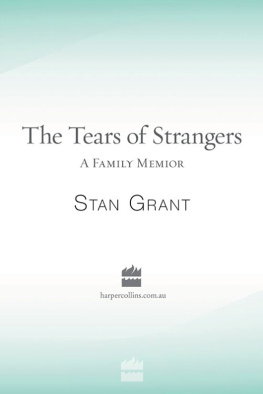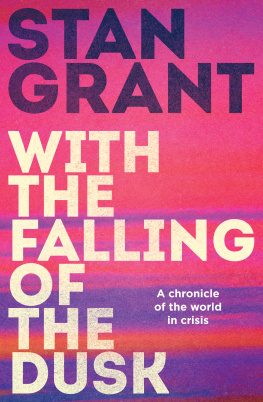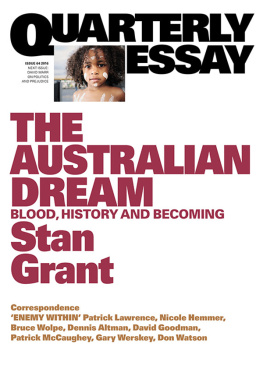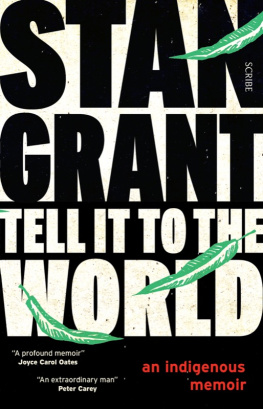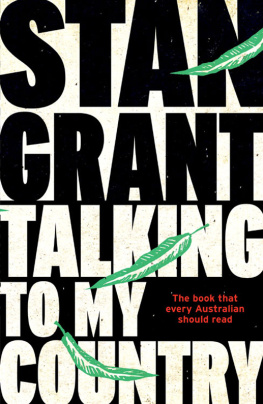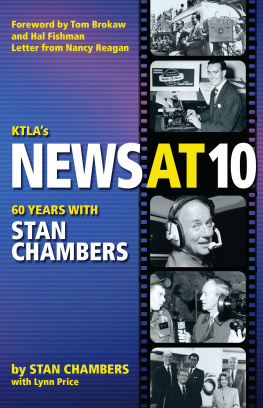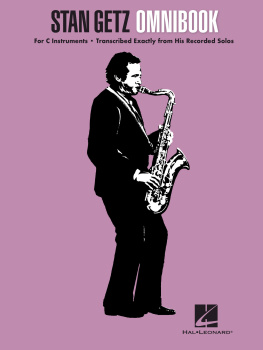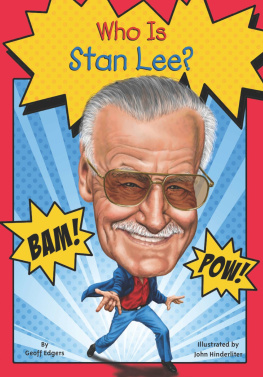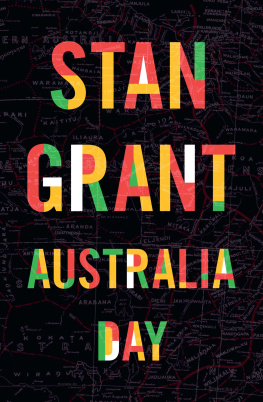Stan Grant - The Tears of Strangers
Here you can read online Stan Grant - The Tears of Strangers full text of the book (entire story) in english for free. Download pdf and epub, get meaning, cover and reviews about this ebook. year: 2016, publisher: HarperCollins, genre: Detective and thriller. Description of the work, (preface) as well as reviews are available. Best literature library LitArk.com created for fans of good reading and offers a wide selection of genres:
Romance novel
Science fiction
Adventure
Detective
Science
History
Home and family
Prose
Art
Politics
Computer
Non-fiction
Religion
Business
Children
Humor
Choose a favorite category and find really read worthwhile books. Enjoy immersion in the world of imagination, feel the emotions of the characters or learn something new for yourself, make an fascinating discovery.
- Book:The Tears of Strangers
- Author:
- Publisher:HarperCollins
- Genre:
- Year:2016
- Rating:3 / 5
- Favourites:Add to favourites
- Your mark:
- 60
- 1
- 2
- 3
- 4
- 5
The Tears of Strangers: summary, description and annotation
We offer to read an annotation, description, summary or preface (depends on what the author of the book "The Tears of Strangers" wrote himself). If you haven't found the necessary information about the book — write in the comments, we will try to find it.
The Tears of Strangers — read online for free the complete book (whole text) full work
Below is the text of the book, divided by pages. System saving the place of the last page read, allows you to conveniently read the book "The Tears of Strangers" online for free, without having to search again every time where you left off. Put a bookmark, and you can go to the page where you finished reading at any time.
Font size:
Interval:
Bookmark:
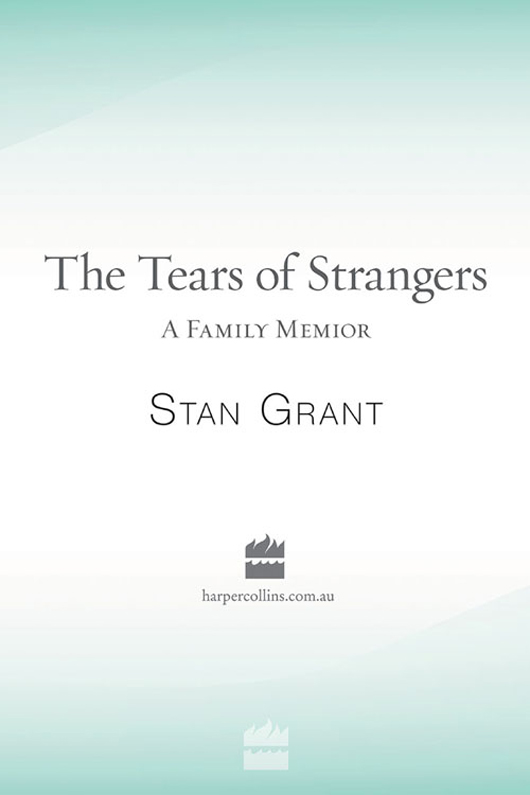
STAN GRANT was born in Griffith, New South Wales, in 1963. His father is from the Wiradjuri people and his mother a descendant of the Kamilaroi. Stan spent most of his childhood on the road, as his father searched for work in small country towns. Stan saw first hand the impact of colonisation on his people and the brutality of outback racism.
Stan is the International Editor at SKY NEWS. From 2001 to 2012 he worked for CNN as an anchor in Hong Kong, before relocating to Beijing as correspondent. As a journalist, he has covered some of the worlds biggest news events. He has received a string of prestigious international awards. He is the author of Talking to my Country (HarperCollins, 2016).
HarperCollinsPublishers
First published in Australia in 2002
This edition published in 2016
by HarperCollinsPublishers Pty Limited
A member of the HarperCollinsPublishers (Australia) Pty Limited Group
www.harpercollins.com.au
Copyright Stan Grant 2002
The right of Stan Grant to be identified as the author of this work has been asserted by her in accordance with the Copyright Amendment (Moral Rights) Act 2000
This work is copyright. Apart from any use as permitted under the Copyright Act 1968, no part may be reproduced, copied, scanned, stored in a retrieval system, recorded, or transmitted, in any form or by any means, without the prior written permission of the publisher.
HarperCollinsPublishers
Level 13, 201 Elizabeth Street, Sydney NSW 2000, Australia
Unit D1, 63 Apollo Drive, Rosedale, Auckland 0632, New Zealand
A 53, Sector 57, Noida, UP, India
1 London Bridge Street, London SE1 9GF, United Kingdom
2 Bloor Street East, 20th floor, Toronto, Ontario M4W 1A8, Canada
195 Broadway, New York NY 10007, USA
ISBN: 978 0 7304 9154 5 (ebook)
National Library of Australia Cataloguing-in-Publication data:
Grant, Stan, 1963- author.
The tears of strangers / Stan Grant.
Grant, Stan, 1963
Grant family.
Wiradjuri (Australian people)
Aboriginal Australians--Biography.
Journalists--Australia--Biography.
305.89915092
Goanna illustration by Max and Gloria Reid
For my father my hero
My people believe in the power of dreams. In dreams we become whole; in dreams we become men. My father came to me in a dream, he came from half a world away and he came to tell me it was all right; whatever had happened and whatever would happen, it was all right.
In my dream Dad was walking toward me, flanked by two of his cousins, my uncles, and they were on the stairs of an old railway platform. There was no-one else around and I was in a time that belonged to neither day nor night. They seemed not to notice me. As they got closer I saw they wore no shoes. It seemed odd. Then, like spirits, they glided past me. Dad paused only to whisper in my ear, At least I dont make excuses for what Ive done.
I woke the next morning with my memory of the dream as clear as if theyd been in the room with me. My fathers message kept replaying over and over in my mind, each time sounding more ominous. It was like a grim prophecy and I was condemned to its fulfilment. At that moment I was as far from Dad as Id ever been. I was the Seven Networks correspondent in London, preparing news reports for broadcast by satellite back to Australia each night. But my father had no need of satellites; his technology was more ancient, yet he came to me as clearly as Id ever appeared on screen.
For two thousand generations my fathers people, the Wiradjuri, had believed in the power of our dreams. The old men, the Walamira, had a psychic gift that enabled them to thrust their minds into the future, into a spirit world where distance, time and space dissolved.
The Walamira were the keepers of our secrets. They had the power of flight and the power of illusion, and they possessed an impenetrable intellect. They could be identified by the light in their eyes and they spoke directly to Baiami to God. Baiami would take young boys in their dreams and ask them if theyd been prepared by their fathers to receive the ancient power and knowledge. Then he would promise to make them men. My father had come to ask me if I was ready to become a man.
Am I ready to become a man? An Aboriginal man? To answer that question Ive had to ask other, even more searching questions. Where do I belong? Who am I? The blood of my fathers links me to a much older place and time. Ive walked in the footprints of my ancestors; Ive sat by the riverbank at night and imagined them around me. I am all that they have made me. Yet I stand apart from them now. I call myself an Aborigine. I know I am from them, but am I still truly of them? James Baldwin said of the modern black American facing his African counterpart:
An American Negro, however deep his sympathies or however bright his rage, ceases to be simply a black man when he faces a black man from Africa.
Aboriginal identity has become too often bound up in sentiment and self-righteousness. Its too often simply convenient. It can wither under too intense a gaze. So too that must be true of me looking into the eyes of many of my black countrymen. Success, or acceptance, has come at a cost to the certainty of my identity. But it can be no other way; to choose otherwise would be to shy away from the arguably meagre yet hard-won freedom my parents have struggled and sacrificed for. This dilemma will confront so many of my brothers and sisters as they too grapple with how to express themselves in a world imposed upon them, which is at the same time tempting, seductive. White Australia engulfs us; we fight for its concession, while it sets the limits of our existence and daily defines us.
Aboriginal identify, then, is the most fragile, brittle of possessions. Blond hair, blue eyes, a straight nose, or just as easily a good car, a nice house, an education, can shake a so-called Aborigines world. The piercing questions, the sneers and jibes are just as often posed by our own as by whites. Yet I cherish my identity. Black I am; black I will ever be. As long as there are Grants the living blood of old Wongamar we will be Aborigines, Wiradjuri. A Chinese friend once told me that home is the last stop on your ancestors journey; my ancestors footsteps have travelled for a hundred thousand years across my land to bring me to this point. Where I end, so will my children begin. I hope that when they are older there is enough Aborigine still in me in them so that I too can come to my sons in their dreams and ask them, Are you ready to become men?
I have spent most of my life... watching white people and outwitting them so that I might survive.
JAMES BALDWIN, NOBODY KNOWS MY NAME
The scene is Sydneys five-star Westin Hotel. Four hundred people have paid $220 a head to reconcile their differences. Theres a former prime minister and his equally famous partner; at least three federal politicians, including the current Leader of the Opposition; an internationally famous actor; assorted television and radio stars; models; and a Booker Prize winning author. They sit next to Aboriginal bureaucrats, Aboriginal athletes and Aboriginal singers, black dancers, actors, lawyers and the former head of the Aboriginal and Torres Strait Islander Commission.
Over a three-course meal washed down with expensive bottles of wine, they lament the lack of a national apology to Aborigines for crimes of the past. The women rattle their jewellery and powder their noses, while the men check their cuff links and straighten their bow ties. As I step up to the podium to welcome them, I cant help being struck by how vaguely obscene this is. Only the day before I had sat with my cousin as he drank himself into a stupor. Hes lived at the coalface of Australian racism: opportunities denied, insults freely given. Hes spent a lifetime looking down. He has the body of a man twice his age and his memory is lost in an alcoholic haze. These people were here to save him? To reconcile on his behalf? Two hundred and twenty dollars, the cost of a place here, would buy him enough food for a month, or enough booze to forget.
Font size:
Interval:
Bookmark:
Similar books «The Tears of Strangers»
Look at similar books to The Tears of Strangers. We have selected literature similar in name and meaning in the hope of providing readers with more options to find new, interesting, not yet read works.
Discussion, reviews of the book The Tears of Strangers and just readers' own opinions. Leave your comments, write what you think about the work, its meaning or the main characters. Specify what exactly you liked and what you didn't like, and why you think so.

